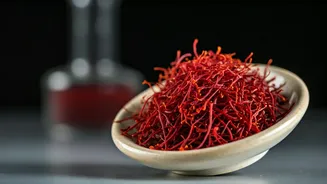Saffron's Promising Results
Saffron, a natural compound with a history spanning over four millennia, presents a promising avenue in Alzheimer's treatment. Research indicates that
participants taking saffron exhibited significantly improved cognitive function compared to those using a placebo. These improvements were measured using the ADAS-cog and CDR scales. Remarkably, side effects were similar across both groups, suggesting that saffron is generally well-tolerated. The study involved random assignment, with one group receiving 30 mg of saffron daily and the other a placebo. Initial results point to saffron being both safe and effective for individuals with mild to moderate Alzheimer's, but the need for more extensive studies is emphasized to confirm these findings.
How Saffron Works
Saffron's efficacy may be attributed to its unique chemical composition, particularly crocin and crocetin, potent antioxidants. These compounds protect the brain from free-radical damage. Moreover, they appear to inhibit the formation of amyloid-beta plaques and tau tangles, key hallmarks of Alzheimer's disease. Another beneficial aspect is saffron's mood-enhancing impact. Historically used as a natural antidepressant, saffron has demonstrated the ability to improve mood and reduce agitation, both prevalent symptoms in the later stages of Alzheimer's. This positive effect on mood may further enhance cognitive function and improve overall quality of life for those affected by the disease.
Saffron's Safety Profile
One of saffron's key advantages is its safety profile. Clinical studies have consistently shown minimal side effects, even with prolonged use over several months. However, due to saffron's high cost, some products may be diluted or adulterated. Therefore, anyone considering saffron supplementation should opt for standardized extracts. Furthermore, consulting a healthcare professional is crucial, especially for those already taking Alzheimer's medications. Looking ahead, the possibility of a natural herb, dating back to ancient times, potentially holding modern therapeutic value is exciting. While not a cure, scientific support suggests saffron may one day be a significant player in the treatment of Alzheimer's, or even outperform current medications.




















